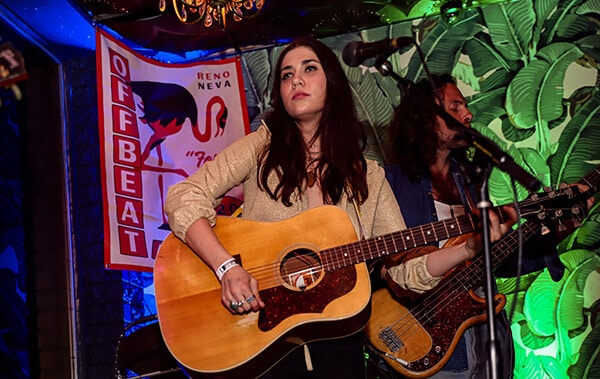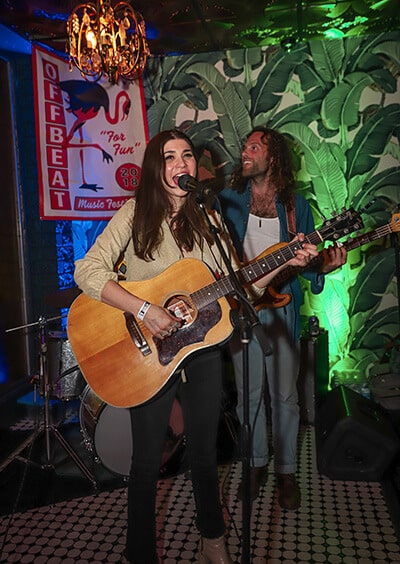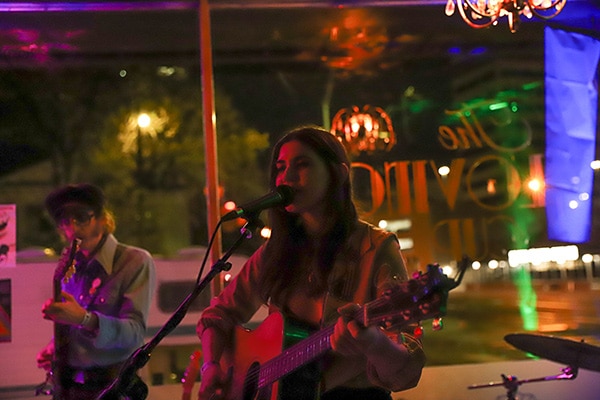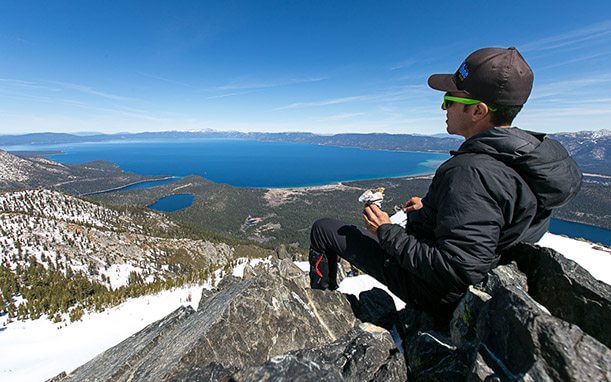
Tahoe Onstage photos by Shaun Astor
Pearl Charles is touring for her first full-length solo record, “Sleepless Dreamer.” At 27, the honey-voiced singer-songwriter conjures up the catchy vintage Americana musicianship of a Neko Case recording during her earlier country-tinged era.
Charles laughs while contemplating her past tenure as a member of a couple different bands: “My first two bands were with my boyfriends at the time, and then I decided I can’t break up with myself, so I’m going to have a solo project.”
Since that time, the Los Angeles native put out her first EP on Orange County’s Burger Records, a label known much more for its garage and fuzz-drenched artists than a crooning pop-country songwriter. But both Charles’ music and storytelling lyrics have evolved noticeably from the EP to her 2018 full length.
“I used to not really like the Grateful Dead – I guess I wouldn’t say I didn’t like them but I just didn’t appreciate them. Then I was asked to join a Grateful Dead cover band, so I had to learn all of the lyrics and really look at the songs. Their storytelling is amazing and so inspiring. Now I don’t know that anyone in the Dead actually wrote the lyrics, they had some lyricists. But I thought that they got into deeper storytelling than they would have on their own. They had literary references, and Biblical references.”
In conversations, Charles speaks like someone who has dived deep into the musical canon, dropping casual references to artists and performers who spent their careers far from popular spotlight and prominence.[pullquote]My whole spiritual outlook is that I’m open to any ideas, but I’m not attached to any at the same time.” [/pullquote]
That being said, she’s not afraid to cite influences who lie at the polar opposite of the esoteric and overlooked spectrum…
“My biggest influence musically is Fleetwood Mac. I’ve always liked cheesy music. Like Fleetwood Mac, they were huge, but they were never quote unquote “cool.” They were mainstream. But I love Christine
 McVie’s writing. I think it’s really straightforward and less poetic… or maybe it’s poetic in the way that it’s straightforward and saying something that seems simple, but the way it’s said, the melody, it really strikes you in a deep way. I think Tom Petty could do that really well, too.”
McVie’s writing. I think it’s really straightforward and less poetic… or maybe it’s poetic in the way that it’s straightforward and saying something that seems simple, but the way it’s said, the melody, it really strikes you in a deep way. I think Tom Petty could do that really well, too.”
She catches herself fawning over Fleetwood Mac and laughs again, mentioning, “My mom hates that stuff and thinks it’s soulless. But I don’t know, I feel it.”
Though Fleetwood Mac is almost the epitome of Mom Rock, when asked what type of music her mom played while she was growing up, Charles says, “She was into Leonard Cohen, John Prine, and Townes Van Zandt.
“I love those guys, too, I totally get the gut-wrenching lyrics. But those guys have some darkness, and we need that. Trust me, I have darkness, too. But how can you have the darkness without the light? You can’t have one without the other. I think Leonard Cohen is only made all the better by The Eagles and ABBA.”
(At this point, we both laugh at the obvious metaphorical dagger through her mother’s aurally angst-filled heart.)
With her background of having played drums and autoharp in her past bands, The Driftwood Singers and The Blank Tapes, and taking up guitar and vocals for her solo work, it seems it would be without question that Charles grew up in a musical household. But she discounts that.
“I grew up in a very creative family, but not necessarily musical. My dad was a filmmaker and my mom was a visual artist. My mom sings, especially as a means to deal with her anxiety. But they both really encouraged my siblings and I to take all sorts of artistic lessons.”
It was serendipitous event, at least as much as you can call a Los Angeles teenager getting caught getting high, that set Charles on her musical path.
“I wanted to be on Broadway, that was my first dream, but I got in trouble for smoking pot in high school. (Because of that) I couldn’t get into one of the plays, so I quit theater as an extracurricular activity. I’m grateful because it led me to where I am now, but it’s funny how those things happen.”
Charles is quick to acknowledge the affect of the desert landscape and mythos in her songwriting. Her parents owned a house in Joshua Tree, and the country music of unconventional players such as Gram Parsons, combined with psychedelics, would color the direction that she would begin to take her music.
“My whole spiritual outlook is that I’m open to any ideas, but I’m not attached to any at the same time. When you take psychedelics, there’s a channel that’s opened and there is information that you receive. Where it comes from – if it’s a higher power, if it’s already within you, I don’t know. But psychedelics made me realize there might be a message out there in the universe that you can receive if you open yourself up to it.”
Charles is carrying these themes even deeper on her songwriting for her next record, though the personal and sentimental still have a presence in her storytelling.
“I think psychedelics have led me on a very deep search for myself, and that’s what the new album is about… “ but catching the absence of another theme that frequently shadows the narratives of her lyrics, she adds, “and pinges of heartbreak along the way.”
— Shaun Astor

Shaun Astor / Tahoe Onstage

